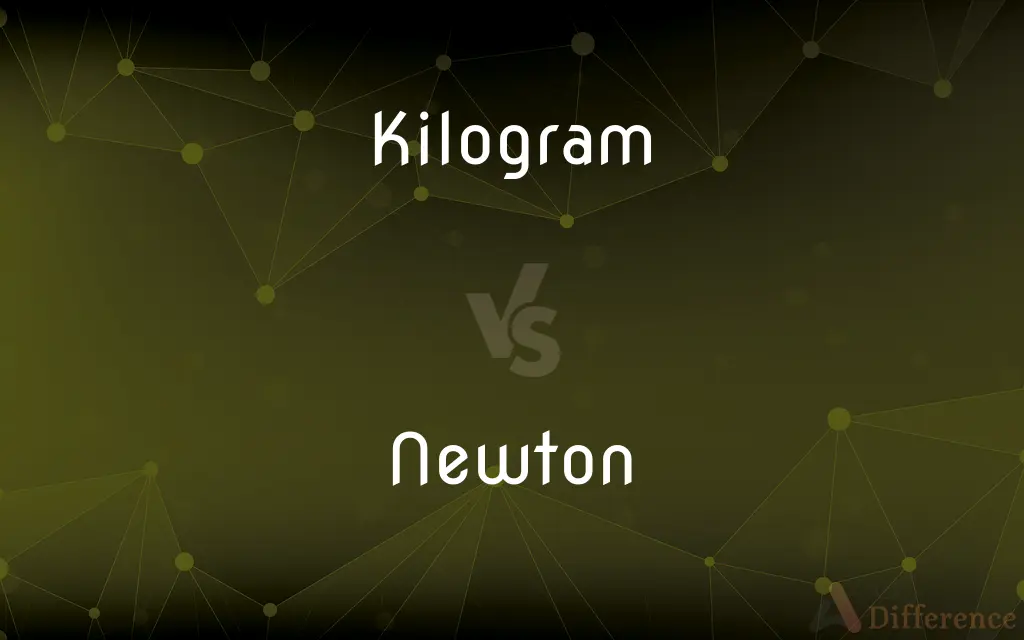Kilogram vs. Newton — What's the Difference?
By Tayyaba Rehman & Urooj Arif — Updated on April 1, 2024
A kilogram measures mass, while a newton measures force. Understanding these units is fundamental in physics and engineering.

Difference Between Kilogram and Newton
Table of Contents
ADVERTISEMENT
Key Differences
The kilogram (kg) is the base unit of mass in the International System of Units (SI), used to quantify the amount of matter in an object. Mass is a scalar quantity, which means it only has magnitude and does not depend on the object's location. On the other hand, the newton (N) is the SI unit of force, named after Sir Isaac Newton in recognition of his work on classical mechanics. Force is a vector quantity, meaning it has both magnitude and direction, and it is defined as the product of an object's mass and its acceleration.
While the kilogram is solely concerned with the amount of matter in an object, the newton relates to the interaction between objects, specifically how much an object is being accelerated or moved. For example, gravity on Earth exerts a force of approximately 9.8 newtons on every kilogram of mass. This distinction highlights how mass (kilograms) and force (newtons) interact but represent different physical concepts.
The usage of kilograms is widespread beyond physics, in daily life for measuring weight, which is technically a force due to gravity acting on a mass. Conversely, newtons are used in more specific contexts, such as engineering and physics, to calculate forces in structures, the power of engines, or the thrust produced by a rocket. This reflects how intrinsic mass and force are to various scientific and engineering principles.
An object's mass measured in kilograms remains constant regardless of its location in the universe, reflecting the intrinsic amount of matter it contains. However, the force acting on the same mass can vary significantly depending on the context, such as gravitational forces on different planets, indicating the situational nature of measurements in newtons.
Although mass and force are fundamentally different, they are intimately related in physical equations and real-world applications. For example, the well-known equation F = ma (force equals mass times acceleration) directly links kilograms and newtons, illustrating how changes in an object's velocity (acceleration) depend on its mass and the applied force.
ADVERTISEMENT
Comparison Chart
SI Unit Of
Mass
Force
Nature
Scalar quantity (only magnitude)
Vector quantity (magnitude and direction)
Dependence
Intrinsic property of matter
Depends on mass and acceleration
Example Usage
Measuring weight of objects
Calculating force in physics and engineering
Related To
Amount of matter
Interaction and movement of objects
Compare with Definitions
Kilogram
Unit of mass.
A bag of rice weighs 5 kilograms.
Newton
Unit of force.
Gravity exerts a force of about 9.8 N on every kilogram of mass on Earth.
Kilogram
Invariant in space.
A kilogram of gold on Earth is the same in space.
Newton
Depends on acceleration.
A car's engine produces force measured in newtons.
Kilogram
Basis for weight.
Your weight on the scale is measured in kilograms.
Newton
Physics applications.
Engineers calculate the structural force in newtons.
Kilogram
Global standard.
The kilogram is defined by a physical constant, not an object.
Newton
Measures push or pull.
It takes several newtons to push a book across a table.
Kilogram
Mass measurement.
Scientists measure chemical substances in kilograms.
Newton
Directional property.
The force applied to a ball is directed according to the newton's magnitude and direction.
Kilogram
The kilogram (also kilogramme) is the base unit of mass in the International System of Units (SI), the metric system, having the unit symbol kg. It is a widely used measure in science, engineering and commerce worldwide, and is often simply called a kilo in everyday speech.
Newton
The SI-derived unit of force required to accelerate a mass of one kilogram one meter per second per second, equal to 100,000 dynes. See Table at measurement.
Kilogram
Abbr. kg The base unit of mass in the International System, equal to 1,000 grams (2.2046 pounds). See Table at measurement.
Newton
In the International System of Units, the derived unit of force; the force required to accelerate a mass of one kilogram by one metre per second per second. Symbol: N.
Kilogram
Kilogram force.
Newton
English mathematician and physicist; remembered for developing the calculus and for his law of gravitation and his three laws of motion (1642-1727)
Kilogram
In the International System of Units, the base unit of mass; conceived of as the mass of one litre of water, but now defined by taking the fixed numerical value of the Planck constant h to be 6.626 070 15 × 10-34 when expressed in units of kg⋅m2⋅s−1. Symbol: kg
Newton
A unit of force equal to the force that imparts an acceleration of 1 m/sec/sec to a mass of 1 kilogram; equal to 100,000 dynes
Kilogram
(proscribed) The unit of weight such that a one-kilogram mass is also a one-kilogram weight.
Kilogram
A measure of weight, being a thousand grams, equal to 2.2046226 pounds avoirdupois (15,432.34 grains). It is equal to the weight of a cubic decimeter of distilled water at the temperature of maximum density, or 39° Fahrenheit.
Kilogram
One thousand grams; the basic unit of mass adopted under the Systeme International d'Unites;
A kilogram is approximately 2.2 pounds
Common Curiosities
What does a kilogram measure?
A kilogram measures the mass of an object, the amount of matter it contains.
How is force measured?
Force is measured in newtons, which quantify the push or pull on an object.
Why do we use kilograms for weight?
Kilograms are used to indirectly measure weight (force) due to gravity on mass.
Can mass and force be directly converted?
No, they're different physical quantities, but they are related through the equation F = ma.
What's the significance of newtons in everyday life?
Newtons help understand and quantify forces in physical and engineering tasks.
What determines the amount of force in newtons?
The mass of an object and the acceleration it undergoes determine the force.
How do you calculate weight in newtons?
Weight in newtons is calculated by multiplying mass in kilograms by the acceleration due to gravity.
How do kilograms and newtons relate in physics?
They are linked by Newton's second law of motion, F = ma, relating mass to force through acceleration.
How does the concept of newtons apply to vehicle dynamics?
Vehicle acceleration, braking, and handling forces are quantified in newtons.
Does mass change with location?
Mass remains constant regardless of location, unlike weight or force which can change.
Why is the kilogram an SI base unit and not the newton?
The SI system is based on fundamental quantities like mass, with force derived from these basics.
Are all forces measured in newtons?
Yes, in the SI system, all forces are measured in newtons.
What role does the kilogram play in the scientific community?
It's essential for precision in scientific measurements, experiments, and manufacturing.
Is a newton a large unit of force?
A newton is a relatively small unit; many everyday forces are measured in hundreds or thousands of newtons.
Can an object have zero newtons of force?
Yes, if there's no net force acting on it, though it might still be under the influence of balanced forces.
Share Your Discovery

Previous Comparison
Numismatic vs. Epigraphy
Next Comparison
Bucket vs. HooptieAuthor Spotlight
Written by
Tayyaba RehmanTayyaba Rehman is a distinguished writer, currently serving as a primary contributor to askdifference.com. As a researcher in semantics and etymology, Tayyaba's passion for the complexity of languages and their distinctions has found a perfect home on the platform. Tayyaba delves into the intricacies of language, distinguishing between commonly confused words and phrases, thereby providing clarity for readers worldwide.
Co-written by
Urooj ArifUrooj is a skilled content writer at Ask Difference, known for her exceptional ability to simplify complex topics into engaging and informative content. With a passion for research and a flair for clear, concise writing, she consistently delivers articles that resonate with our diverse audience.














































